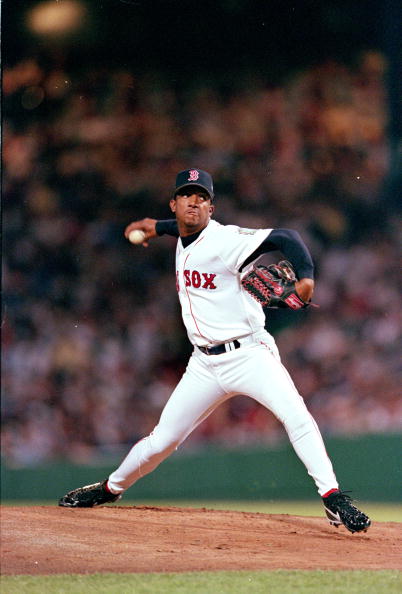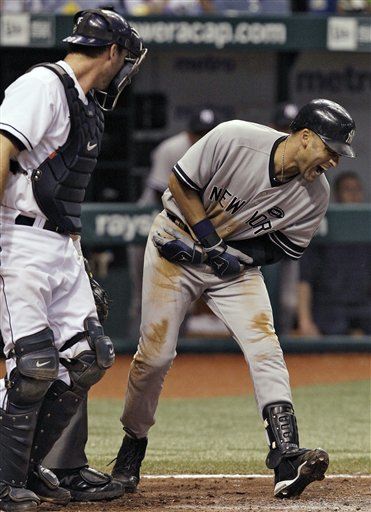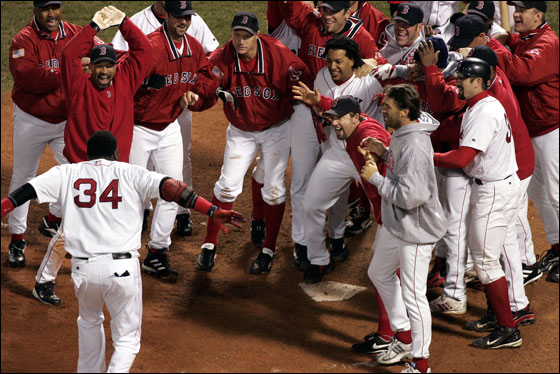Wednesday October 06, 2010
Bottom of the 10th
I still can't decide if the second half of Ken Burns's “Tenth Inning” doc, about the 2000s, made up for some of the problems in the first half, about the 1990s, or if, because the aughts corrected some of the '90s excesses (performance enhancing drugs; Yankees world championships), such a turnaround is inevitable.
What Burns does works. But he's still presenting the narrative of the time (“Wow, look at all these homeruns!”) with only a bit of foreshadowing (psst: chemicals may be involved). John Thorn still says with a straight face: “You can forget about the debate... the greatest pitcher in the history of baseball is Roger Clemens.” Tom Veducci still says of Barry Bonds: “This is the most feared hitter who ever lived.” The metaphor I brought up last time still works. It's as if Burns is reveling in the Cincinnati Reds amazing upset over the Chicago White Sox in the 1919 World Series before coughing and adding the historical perspective: “Oh, by the way: the Sox were paid to lose.”
None of the talking heads are angry enough about steroids, either. The record books are meaningless now. Trust in the game is  meaningless. There's a discussion at the end about the asterisk next to Bonds' homerun record, the career one, 762 homeruns, and most of the talking heads—not wishing to sound like Ford Frick on Roger Maris—say of course not, no asterisk, before adding that, yes, there is a metaphoric one. “The asterisk is whatever exists in the minds of fans,” Dan Okrent says (dismissively?). Yes, it is. But it's not just with Bonds' record; it's with the entire era. The last 20 years of baseball has an asterisk. What's legitimate and what isn't? What counts and what doesn't? Albert Pujols has the best first five seasons of any player ever. Is he juiced? Jose Bautista, this year, at the age of 29, hits 54 homeruns, when his career-best had been 16. Do alarm bells go off? Did anyone in the pre-steroid era make such a leap? The tragedy isn't Barry Bonds, it's all of baseball. Everything is tainted. And the taint ain't over.
meaningless. There's a discussion at the end about the asterisk next to Bonds' homerun record, the career one, 762 homeruns, and most of the talking heads—not wishing to sound like Ford Frick on Roger Maris—say of course not, no asterisk, before adding that, yes, there is a metaphoric one. “The asterisk is whatever exists in the minds of fans,” Dan Okrent says (dismissively?). Yes, it is. But it's not just with Bonds' record; it's with the entire era. The last 20 years of baseball has an asterisk. What's legitimate and what isn't? What counts and what doesn't? Albert Pujols has the best first five seasons of any player ever. Is he juiced? Jose Bautista, this year, at the age of 29, hits 54 homeruns, when his career-best had been 16. Do alarm bells go off? Did anyone in the pre-steroid era make such a leap? The tragedy isn't Barry Bonds, it's all of baseball. Everything is tainted. And the taint ain't over.
For a time I thought Burns's narrative should've focused on the great players who didn't partake (Ken Griffey, Jr.; Frank Thomas), and who were subsequently overshadowed by those who did (McGwire, Sosa, Bonds, A-Rod), but of course we're back to the impossibility of proving a negative. We don't know that Griffey and Thomas didn't partake; we just assume it from their career trajectories.
But if they didn't, isn't that the tragedy? The overshadowing of the legitimate by the illegitimate? The doc says the inflated players were a reflection of the inflated times (stock market; housing market) and excuses them. That's a cop-out. Baseball should not reflect the worst of our society; it should be an oasis from the worst in our society.
Other problems:
- The hyperbole: Pedro Martinez “made himself into one of the greatest players the game had ever seen.” Mariano Rivera became “the most successful closer of all time.” Randy Johnson was “the most feared left-hander of all time.” The Yankees were led by Derek Jeter, “one of the most popular and respected players in baseball history.” It's not that I don't agree with some of these statements; it's that they're a) hard to prove (and thus meaningless), and, b) a bit much when strung together. It feels like lazy writing.



RJ: feared. Pedro: great. Jeter: respected.
- Turning the New York Yankees into underdogs: Here's Tom Boswell on the 2001 World Series: “Johnson and Schilling are more dominant now than anyone in the history of baseball. And that's what the Yankees are up against.” I suppose this could go under hyperbole, too. (More dominant than Koufax/Drysdale?) But it's worse than the average hyperbolic statement because it's turning a team that has won three World Championships in a row, and 26 overall, and has the highest payroll in baseball, into the underdog.
- Turning the New York Yankees into “America's team”: Voiceover on the 2001 World Series: “The New York Yankees, the team much of America was rooting for, had lost.” Another narrative of the time that I didn't buy at the time and don't buy now. Where's the evidence? Maybe among the general population, maybe among non-baseball fans—the kind of people who only know from Willie Mays and Derek Jeter—sure, why not? Post-9/11, with all the NYPD caps and NYFD caps and shots of Rudy G. sitting in the stands, the Yankees were probably less hated than normal. But among baseball fans? Who had just suffered through three years of Yankee celebrations and 26 in all? Who suffered through Yankee fans talking up rings as if they owned them? I remember bottom of the ninth in Game 7 when Mark Grace led off with a single and David Delucci pinch-ran for him and then Damian Miller laid down a fat bunt in front of Rivera who opted to go for the force at second. Delucci came in hard, safe, and Jeter, covering the bag, grabbed his ankle, which was already injured. And I got up close to my TV set and yelled, “Writhe, Jeter, writhe!” Admittedly I'm a special case. But America's team? Only in the way that Goldman Sachs is American's investment bank: big and bloated and known and despised.
- Turning the spectacular losses of the New York Yankees into tragic events: Burns did this in his original doc with the 1960 World Series. Bill Mazeroski hits one of the most famous homeruns ever hit and who do we hear from? The Pirates and their fans? No. We hear from the Yankees and their fans. Billy Crystal: “I still hurt,” etc. Same here. On 2001, do we hear from the Diamondbacks and their fans about this improbable, beautiful, spectacular, bottom-of-the-ninth-inning victory over Mariano Rivera and the New York Yankees? Nope. Cue Billie Holliday's “God Bless the Child” and cut to Joe Torre saying, “That night was about as sad as it gets.” Oh, boo hoo, motherfucker. Just four rings in your pocket instead of five. If Ken Burns, a supposed Red Sox fan, doesn't realize that every Yankees loss is a moment for celebration then he shouldn't be baseball's documentarian. I mean: Billie Holliday? The song's about poverty, Ken. God bless the child that's got a $200 million payroll.
- VORP? OPS? One of the biggest stories of the 2000s was the acceptance, after decades of knocking at the baseball door, of Bill Jamesian stats, by Oakland GM Billy Beane and others, which helped transform the game. It's part of the reason why the Yankees stopped winning and the Red Sox started; and it's part of the reason why the Yankees began to win again. Brian Cashman did his work. He read Moneyball and changed his ways. So why not an interview with Bill James, Rob Neyer, Michael Lewis? Why not Billy Beane or Theo Epstein or Brian Cashman? Instead we get Jon Miller channeling Sid Dithers. Vas you talkin' to me? It's like Ron Paul explaining why big government is necessary.
- “The popularity of the sport is just enormous.” This is Commissioner Bud Selig, one of Burns's talking heads, trotting out his company line. And measured by attendance, sure, there's some truth in it, but that's only because baseball has been turned into a family event. The appeal is as much the mascot and the fireworks and the various races (hydro/presidents/sausages) as the game itself. Maybe it's more than the game itself. The answer to his comment is in World Series ratings, which drop and keep dropping, in a way that, even in this fragmented, internetted age, the ratings for the Super Bowl don't. The Super Bowl is still central to our culture. The World Series isn't. In baseball, fans root for their team but not for the game, and that's part of the problem. Maybe that's the whole problem.
- “Bonds hits it high! He hits it DEEP! It is...outta here!” I didn't need to hear this as often as I heard it.
But the doc got right that dispiriting, record-breaking 756th homerun. “The whole thing was a joyless march toward the inevitable,” Bob Costas says. “Baseball powerless. Selig with his hands in his pockets...”
It was smart tapping ESPN's editorial director Gary Hoenig as a talking head. He had great comments throughout but my favorite was on Mark McGwire's testimony before U.S. Congress: “And you could just see him deflate like a giant balloon in a Thanksgiving Day parade...”
And it got right the sheer, magical joy of the Red Sox thumping the Yankees in the 2004 ALCS. “It was,” announcer Keith David intoned, “the greatest comeback in baseball history.”
And for once, that wasn't hyperbole.

Baseball's Active Leaders, 2023
What Trump Said When About COVID
Recent Reviews
Everything Everywhere All at Once (2022)
Black Panther: Wakanda Forever (2022)
Doctor Strange in the Multiverse of Madness (2022)
Spider-Man: No Way Home (2021)
The Cagneys
A Midsummer Night's Dream (1935)
Something to Sing About (1937)
Angels with Dirty Faces (1938)
A Lion Is In the Streets (1953)
Man of a Thousand Faces (1957)
Never Steal Anything Small (1959)
Shake Hands With the Devil (1959)







